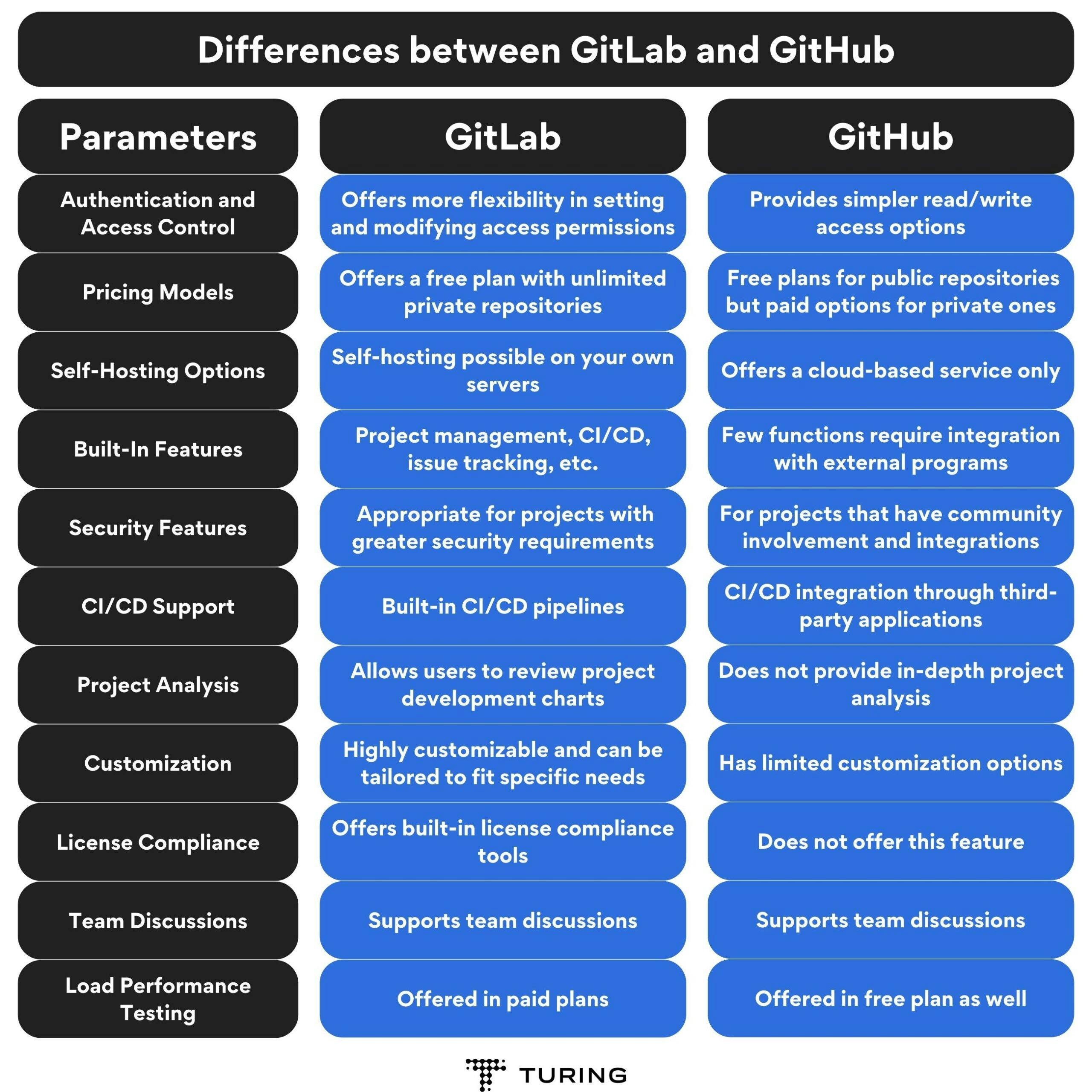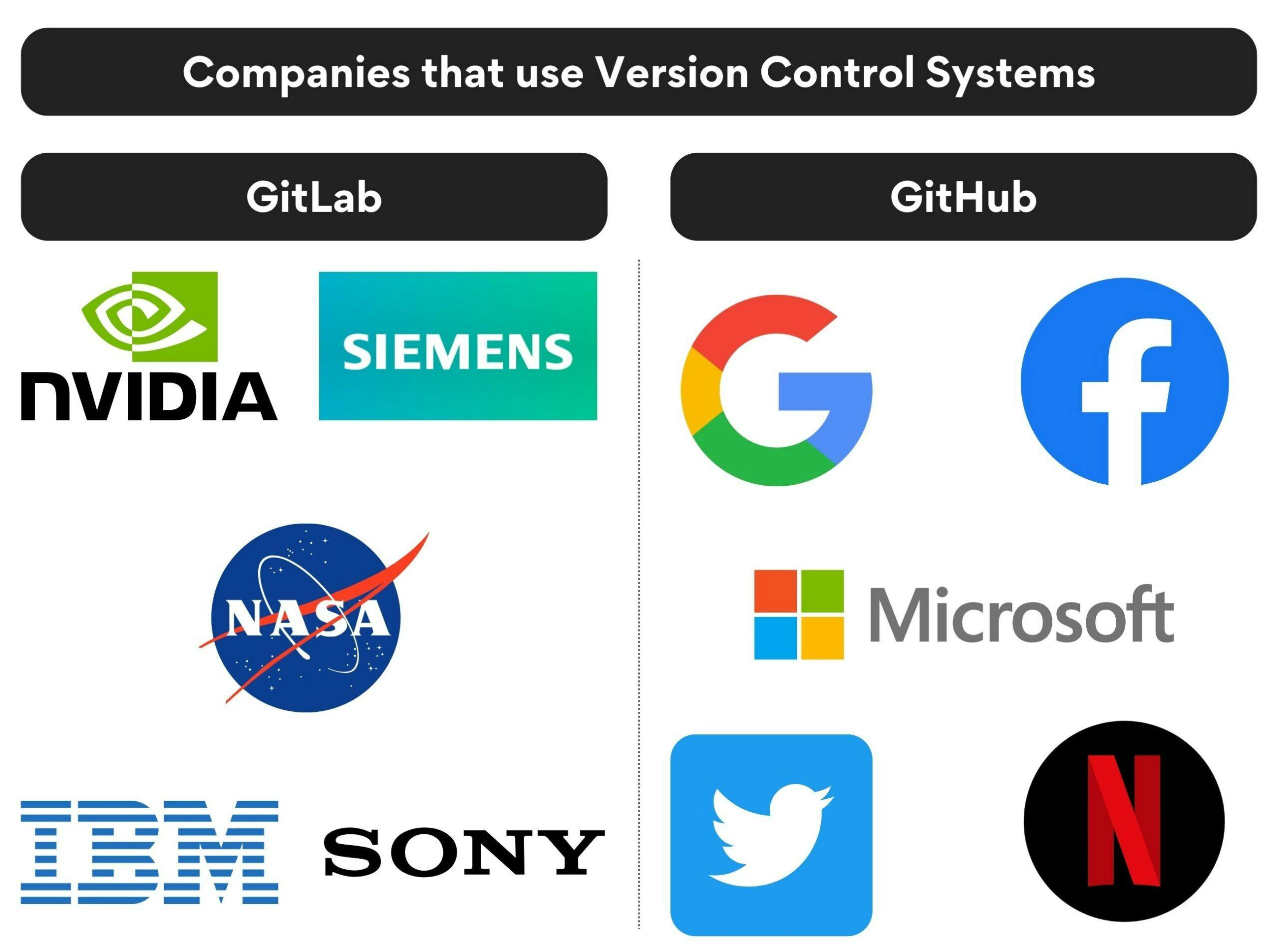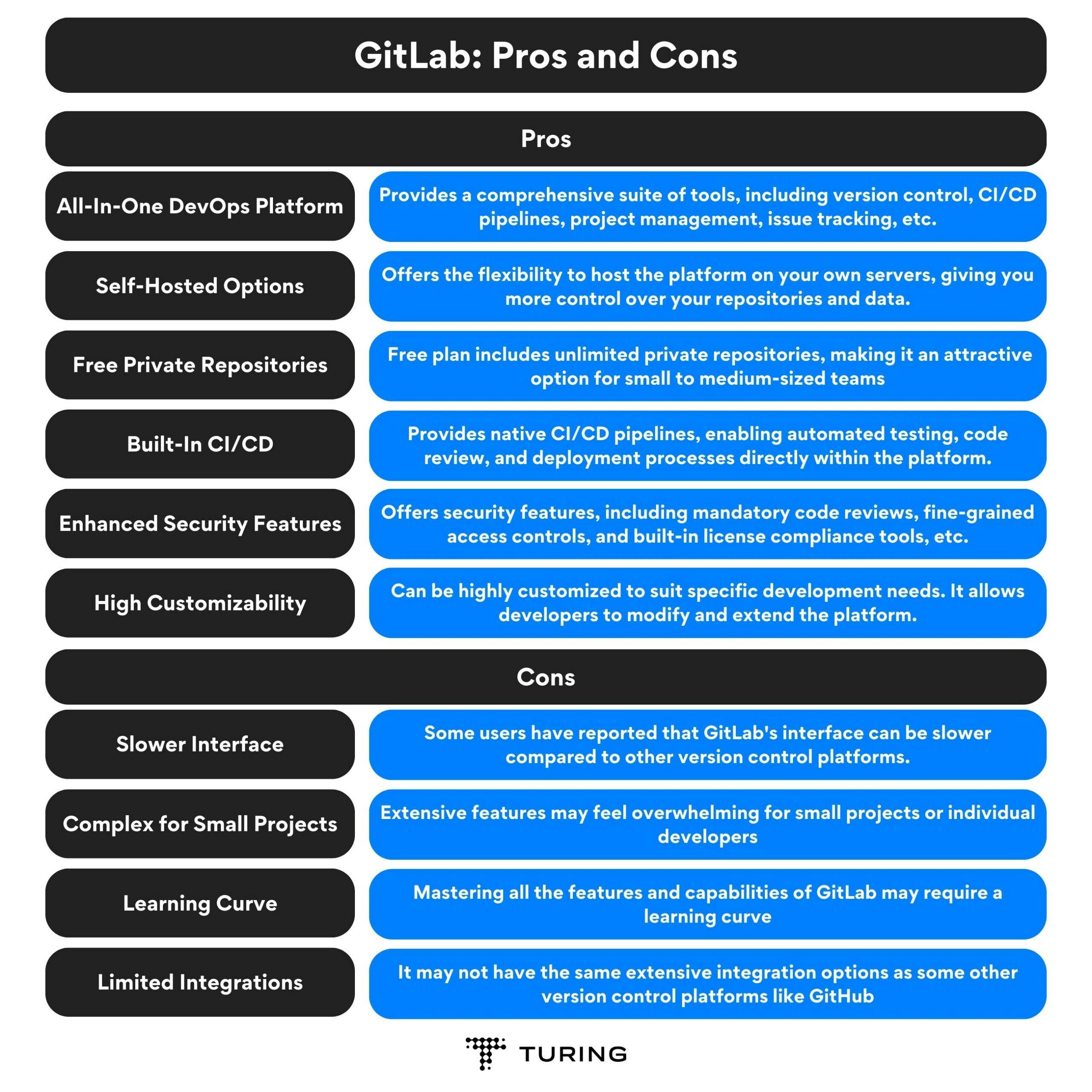GitLab vs GitHub: Which is better and why? Let’s find out. As you know, version control systems are essential for maintaining code repositories, encouraging team cooperation, and guaranteeing the timely completion of projects in the fast-paced world of software development. Two of the most well-known and potent version control systems that have completely changed how developers work are GitHub and GitLab.
Let’s take a look at similarities, differences, use cases, features, pricing, and much more about GitLab and GitHub. Here is a comprehensive guide for you on GitLab vs GitHub:
What is GitHub?
GitHub, a web-based hosting service established in 2008, is based on Git, a popular distributed version control system. GitHub has over 56 million members and has established itself as the leading platform for hosting, sharing, and collaboration of code.
Its intuitive user interface, broad community support, and smooth tool integrations have all contributed to its enormous appeal among developers of all skill levels.
What is GitLab?
GitLab, developed in 2011, is also a web-based platform offering version control functionalities similar to GitHub. However, GitLab portrays itself as an all-in-one DevOps platform, offering not only hosting for Git repositories but also integrated CI/CD, project management, issue tracking, and more.
GitLab has more than 31 million members, and more than 35 percent of Java developers choose GitLab over other code repositories, giving it a distinct advantage in this market.
GitLab vs GitHub: Similarities
GitHub and GitLab surely have differences, but let’s first take a look at the similarities both of these version control systems have to offer:
1. Third-Party Integrations: Both GitLab and GitHub include robust third-party interfaces that let developers integrate a variety of tools and services into their workflows.
2. Issue Tracking and Project Management: The integrated issue tracking and project management tools provided by GitHub and GitLab enable teams to successfully manage tasks, milestones, and collaborate.
3. Wiki-Based Documentation: Wiki-based documentation is supported by both systems, making it simpler to preserve project-related data and spread knowledge within the team.
4. Version Control with Git: GitHub and GitLab are both built on top of Git, enabling developers to utilize their powerful version control capabilities for efficient code management.
5. CI/CD Support: While GitHub offers CI/CD integration through third-party apps, GitLab provides native CI/CD pipelines, making it an all-in-one solution for automated testing and deployment.
Difference Between GitHub and GitLab

Differences Between GitLab and GitHub
There are some major differences between GitHub and GitLab. Let’s take a look.
1. Authentication and Access Control: GitLab offers more flexibility in setting and modifying access permissions for different roles and responsibilities within the team, whereas GitHub provides simpler read/write access options.
2. Pricing Models: GitLab offers a free plan with unlimited private repositories, making it more cost-effective for small to medium-sized teams. In contrast, GitHub has free plans for public repositories but has paid options for private repositories.
3. Self-Hosting Options: Self-hosting through GitLab is possible on your own servers, giving you more control over repositories and data. GitHub, however, functions as a cloud-based service.
4. Built-In Features: Project management, CI/CD, issue tracking, and other functions are all included in the wide set of built-in capabilities of GitLab. Many of the functions offered by GitHub are comparable, however, some require integration with external programs.
5. Security Features: GitLab is appropriate for projects with greater security requirements since it provides more powerful security features including fine-grained access controls and required code reviews.
6. CI/CD Support: GitLab has built-in CI/CD pipelines, which makes it a one-stop shop for automated testing and deployment. Through third-party applications, GitHub provides CI/CD integration.
7. Project Analysis: GitLab allows users to review project development charts, while GitHub does not provide in-depth project analysis.
8. Customization: GitLab is highly customizable and can be tailored to fit specific needs, while GitHub has more limited customization options.
9. License Compliance: GitLab offers built-in license compliance tools, ensuring codebases meet licensing requirements. GitHub lacks this feature.
10. Team Discussions: Both GitLab and GitHub support team discussions, fostering collaboration and communication within development teams.
1 1. Load Performance Testing: GitHub offers load performance testing features in the app, while GitLab provides them in paid plans.
GitLab vs GitHub: Which companies use GitLab?

Companies that use GitLab or GitHub
GitLab has grown significantly in popularity among developers and has been extensively embraced by businesses of all sizes, from start-ups to major corporations.
The following well-known businesses use GitLab for their version control and collaboration requirements:
- NVIDIA: The leading graphics processing unit (GPU) manufacturer utilizes GitLab for its software development and version control processes.
- Sony: To manage its code repositories and improve its software development operations, Sony uses GitLab.
- NASA: To facilitate cooperation among its teams working on various projects, the National Aeronautics and Space Administration (NASA) employs GitLab for version control.
- IBM: One of the biggest technological corporations in the world, IBM, uses GitLab to enable code management and teamwork among its international development teams.
- Siemens: To oversee its software development projects and guarantee seamless developer cooperation, the international company Siemens uses GitLab.
GitLab vs GitHub: Which companies use GitHub?
GitHub has a large user base that consists of independent developers, open-source initiatives, and numerous well-known businesses. The following well-known businesses make use of GitHub for version control and code collaboration:
- Microsoft: Microsoft, GitHub’s parent company, actively uses GitHub for its own software development projects and supports a number of open-source initiatives.
- Google: Google is a tech giant that actively participates in the open-source community and hosts a large number of open-source projects on GitHub.
- Facebook: Facebook collaborates on numerous open-source projects and uses GitHub to manage its development repositories.
- Twitter: The world’s largest social media platform, Twitter, uses GitHub for version control, collaboration, and sharing of its breakthroughs in open-source projects.
- Netflix: To maintain its software and interact with the open-source community, the well-known streaming service uses GitHub.
GitLab pros and cons

GitLab Pros and cons
Pros of GitLab:
1. All-In-One DevOps Platform: GitLab provides a comprehensive suite of tools, including version control, CI/CD pipelines, project management, issue tracking, and more, all within a single platform. This integrated approach streamlines development workflows and reduces the need for external tools and integrations.
2. Self-Hosted Options: GitLab offers the flexibility to host the platform on your own servers, giving you more control over your repositories and data. This self-hosting option is valuable for organizations that prioritize data privacy and security.
3. Free Private Repositories: GitLab’s free plan includes unlimited private repositories, making it an attractive option for small to medium-sized teams or individual developers who require private code repositories without additional costs.
4. Built-In CI/CD: GitLab provides native CI/CD pipelines, enabling automated testing, code review, and deployment processes directly within the platform. This built-in functionality simplifies the setup and configuration of CI/CD workflows.
5. Enhanced Security Features: GitLab offers robust security features, including mandatory code reviews, fine-grained access controls, and built-in license compliance tools, ensuring a secure development environment.
6. High Customizability: GitLab can be highly customized to suit specific development needs. Its open-source nature allows developers to modify and extend the platform to fit their unique requirements.
Cons of GitLab:
1. Slower Interface: Some users have reported that GitLab’s interface can be slower compared to other version control platforms. However, GitLab continues to improve its performance with each update.
2. Complexity for Small Projects: GitLab’s extensive features may feel overwhelming for small projects or individual developers who seek a more streamlined and lightweight version control solution.
3. Considerable Learning Curve: Mastering all the features and capabilities of GitLab may require a learning curve, especially for those new to DevOps practices and continuous integration.
4. Limited Integrations: Although GitLab offers various integrations, it may not have the same extensive integration options as some other version control platforms like GitHub, which has a more extensive marketplace.
GitHub pros and cons

GitHub Pros and cons
Pros of GitHub:
1. Extensive Open-Source Community: GitHub is home to a vast and active open-source community, making it an ideal platform for collaborating on open-source projects and contributing to global development efforts.
2. User-Friendly Interface: GitHub’s intuitive interface and user-friendly design make it easy for developers of all levels to navigate, manage repositories, and collaborate with others effectively.
3. Good Integration Ecosystem: GitHub offers a wide range of integrations with various third-party tools, allowing developers to enhance their workflows and seamlessly connect with other popular development services.
4. Robust Project Management: GitHub provides effective project management tools, including issue tracking, milestones, labels, and project boards, enabling teams to organize and prioritize tasks efficiently.
5. Free Public Repositories: GitHub allows developers to host an unlimited number of public repositories for free, making it a cost-effective option for open-source projects and public code sharing.
6. CI/CD Workflows: GitHub Actions, its native CI/CD solution, empowers developers to automate their testing, building, and deployment processes directly within the platform.
7. Integration with Microsoft Services: As part of Microsoft’s portfolio, GitHub integrates seamlessly with other Microsoft tools and services, such as Azure, Visual Studio, and Azure DevOps.
8. Active Community Support: GitHub’s community-driven nature ensures an abundance of support, documentation, and resources, making it easier for developers to find solutions to their queries.
Cons of GitHub:
1. Limited Private Repositories on Free Plan: GitHub’s free plan offers only a limited number of private repositories, which may be a constraint for individual developers or small teams requiring more private spaces.
2. Paid Features for Private Repositories: To access advanced features, such as code review, team management, and more extensive security options, users must subscribe to GitHub’s paid plans, which can be costly for some organizations.
3. No Built-In Code Quality Tools: While GitHub Actions provides CI/CD capabilities, it lacks built-in code quality tools, requiring developers to rely on third-party integrations for comprehensive code analysis.
4. Reliance on Third-Party Integrations: GitHub heavily relies on third-party integrations to extend functionalities beyond basic version control, which can lead to potential compatibility issues or reliance on external services.
5. Limited Self-Hosting Options: Unlike GitLab, GitHub does not offer self-hosting options, which might be a concern for organizations seeking complete control over their infrastructure and data.
GitLab vs GitHub: Which one should you choose?
Both GitHub and GitLab are powerful code management platforms, each offering unique features and advantages. Your choice between the two depends on your specific project requirements, team size, budget constraints, and security needs.
Go for GitLab if you’re looking for a built-in CI/CD system, more control, and self-hosting. If you’re looking for a larger community, a user-friendly interface, or better integration with other services, you can go for GitHub.
Regardless of the platform you choose, adopting a version control system like GitHub or GitLab is essential for efficient and successful software development. So, evaluate your needs, explore the features, and make an informed decision to boost your development process.
FAQs
1. Is GitLab better than GitHub?
Choosing GitLab or GitHub depends on your needs. GitLab offers a built-in CI/CD system, more control, and self-hosting. GitHub has a larger community, a user-friendly interface, and better integration with other services.
2. Is GitLab more expensive than GitHub?
GitLab offers a free plan with unlimited private repositories, making it more cost-effective for small to medium-sized teams. In contrast, GitHub has free plans for public repositories but has paid options for private repositories. It seems like GitLab is not more expensive than GitHub.
3. Do companies use GitLab?
Yes, tech companies worldwide are using GitLab. These companies include Sony, NVIDIA, NASA, Siemens, IBM, etc.
4. When should you use GitLab over GitHub?
You should consider using GitLab over GitHub when you require a comprehensive built-in CI/CD system, as GitLab’s CI/CD is more robust. If you need more control over your data and infrastructure, GitLab’s self-hosting option can be a significant advantage. GitLab also offers more visibility and control, especially for larger teams, with detailed insights into code status, quality, and more. If you’re working on projects with high-security requirements, GitLab’s fine-grained access controls and required code reviews can be beneficial. Lastly, GitLab’s pricing structure can be more cost-effective for larger teams.
5. Is GitLab more secure than GitHub?
Both GitLab and GitHub prioritize security, offering features like two-factor authentication and vulnerability detection. GitLab, however, provides additional security tools such as Static and Dynamic Application Security Testing, Dependency Scanning, and Container Scanning. It also offers fine-grained access controls and a self-hosting option, giving you more control over your data. While both are secure, GitLab may offer a higher level of security control depending on your needs.
6. Which is better for project management: GitLab or GitHub?
Both GitLab and GitHub offer project management features. GitHub has basic project management tools like issue tracking and project boards. GitLab, on the other hand, provides more advanced features such as issue weights, burn-down charts, and roadmaps, making it a more comprehensive solution for project management. Therefore, if project management is a priority, GitLab might be a better choice.

Ritvik Gupta
Want to accelerate your business with AI?
Talk to one of our solutions architects and start innovating with AI-powered talent.



